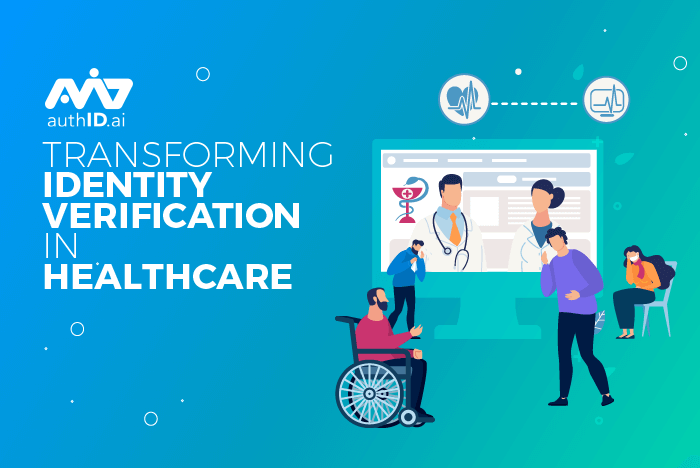While the shift to a digital world has impacted many industries, the healthcare sector has often lagged behind in that transformation. This is now changing. The current pandemic has triggered a rapid expansion of telemedicine services, and an increased reliance on online patient portals delivering medical records at the touch of a finger.
Keeping up with this digital transformation allows medical institutions to streamline services and improve the quality of patient experience. Regulations have also prompted the medical field to adopt technology for more secure means of storing and controlling access to patients’ information.
But as with other industries, cyber criminals are seizing upon this movement to target healthcare organizations, pharmaceutical companies and medical research organizations in attempts to gather protected personal information.
Accordingly, as the health sector continues to move online, the industry must take steps to ensure that identity proofing, the trusted identification of an individual, plays a critical role in digital health care practices.

Standards for Protecting Access to Patients Sensitive Data
The Health Insurance Portability and Accountability Act (HIPAA) established the national standards for safeguarding the privacy and security of an individual’s medical records and other health information, including healthcare transactions.
It obligates the medical sector to ensure that a patient’s information is kept secure and confidential, accessible only to authorized individuals, and used only for intended purposes.
Health institutions must determine the necessary security measures to be implemented to keep up with these standards, including the technologies to be used.
Integration of mobile biometric identification solutions into the medical industry can ensure that a patient’s claimed identity is legitimate.
The use of remote identity proofing not only allows medical institutions to comply with regulations but also assures the safety and security of patients and providers.
Remote identity verification along with the use of automated identity document authentication can provide healthcare providers with a reliable solution to mitigate identity fraud.
Remote Patient Check-In
With computers, smartphones, and tablets, patients can more easily access health portals and mobile apps to complete their intake records from the convenience of their home, and even enjoy touchless check-in at point-of-care. Remote check-in automates patient registration processes and streamlines information recall. It allows personal health information collection and integrates the data into a secure electronic recordkeeping platform compliant to regulation standards.
To ensure healthcare providers that the legitimate patient is accessing their services, they can employ mobile biometric identity verification and identity document authentication during preregistration and strong multi-factor authentication at the point of service. These services match a person’s biometric modalities to credentials presented during the process to speed up patient enrollment and weed out fraudulent identities.
Organizations can step up assurance with automated driver’s license authentication or services that verify a person’s presented documents to existing records in trusted sources like government registries Identity document authentication ensures higher accuracy and authenticity of the information an individual provides. Likewise, it can be used before authorizing access to medical records by healthcare workers.
Telemedicine Appointments
Now more than ever, as a result of COVID-19, the importance of telemedicine in healthcare is apparent. Telemedicine is here to stay as it offers options for quality care while still practicing social distancing. Telemedicine leverages HIPAA-compliant communication technologies and video conferencing for remote consultations between patients and doctors.
Health providers must ensure that they conduct telemedicine appointments on a secure platform to prevent risks. Online healthcare portals and dedicated telemedicine apps with integrated security features are often used by healthcare providers to streamline their services.
Moreover, incorporating remote identity verification and strong biometric authentication processes allows telemedicine providers to verify that the patient of record is the one using their services. These modern authentication solutions ensure clinicians that they are providing medical care to legitimate patients.
Patient Portals
Patient portals provide an easier way for patients to view test results, request prescription refills, and communicate with their physicians. They can use their mobile devices to log into their portal accounts and access electronic medical services from the health provider.
Implementing patient portals also improves consumer trust. According to an Athena research study, patients with portal accounts are more likely to return to a specific healthcare provider.
However, health organizations must deploy security measures to prevent unauthorized access to a patient’s account.
A strong authentication factor like facial biometrics can eliminate password logon and make identity authentication more secure and efficient. Implementing mobile biometric authentication solutions instead of using easily stolen or forgotten knowledge-based authentication alternatives offers higher assurance that only the legitimate patient can log into their portal account.
Health Providers Access to Health Records
Electronic medical records (EMR) and electronic health records (EHR) are digital documents containing a patient’s health information.
These electronic records are vital for clinicians to diagnose and treat patients accurately. Likewise, they are essential for coordinating care and making medical decisions.
Healthcare institutions must ensure that these records are accessible only by authorized individuals and that their data storage and sharing platforms are compliant with HIPAA standards.
These platforms should include solutions for trusted identity verification and strong identity authentication, as well as valid audit trails that allow for verification of a health professional’s identity before logging into their medical database.
Conclusion
As the health sector continues to move online, the industry faces challenges of identity fraud and medical account takeover.
Healthcare providers must ensure that patients of record are the ones using their services. Likewise, they must ensure that only authorized individuals have access to electronic health records.
Anti-fraud technologies are available, and medical organizations must leverage the best identity verification and authentication services.
authID‘s Proof™ and Verified™ solutions provide reliable identity verification and strong multi-factor authentication, integrated with an audit trail of activities to help healthcare institutions stop identity fraud in its tracks.
Schedule a Demo with authID
authID.ai is a provider of an Identity as a Service (IDaaS) platform that delivers a suite of secure, mobile, biometric identity solutions, available to any vertical, anywhere. With authID‘s solutions, health institutions can better protect their patients’ sensitive data and provide reliable services. Contact authID today at +1 (516) 778-5639 or click here to schedule a demo.

